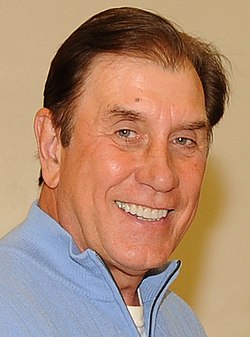 Tomjanovich in 2009 | |
| Personal information | |
|---|---|
| Born | November 24, 1948 Hamtramck, Michigan, U.S. |
| Listed height | 6 ft 8 in (2.03 m) |
| Listed weight | 228 lb (103 kg) |
| Career information | |
| High school | Hamtramck (Hamtramck, Michigan) |
| College | Michigan (1967–1970) |
| NBA draft | 1970: 1st round, 2nd overall pick |
| Drafted by | San Diego Rockets |
| Playing career | 1970–1981 |
| Position | Power forward |
| Number | 45 |
| Coaching career | 1983–2005 |
| Career history | |
Playing | |
| 1970–1981 | San Diego / Houston Rockets |
Coaching | |
| 1983–1992 | Houston Rockets (assistant) |
| 1992–2003 | Houston Rockets |
| 2004–2005 | Los Angeles Lakers |
| Career highlights | |
As player:
As coach: | |
| Career playing statistics | |
| Points | 13,383 (17.4 ppg) |
| Rebounds | 6,198 (8.1 rpg) |
| Assists | 1,573 (2.0 apg) |
| Stats at NBA.com | |
| Stats at Basketball Reference | |
| Career coaching record | |
| NBA | 527–416 (.559) |
| Record at Basketball Reference | |
| Basketball Hall of Fame | |
Medals | |
Rudolph Tomjanovich Jr. (born November 24, 1948) is an American former professional basketball player and coach. He won two NBA Championships with the Houston Rockets (1994, 1995) and coached Team USA to the gold medal in men's basketball at the 2000 Summer Olympics.
Contents
- Early life
- College career
- Professional career
- San Diego / Houston Rockets (1970–1981)
- Coaching career
- Houston Rockets (1992–2003)
- Los Angeles Lakers (2004–2005)
- Coaching style
- United States national team
- Personal life
- Accomplishments
- NBA career statistics
- Regular season
- Playoffs
- Head coaching record
- See also
- Footnotes
- References
- External links
His professional playing career, which lasted between 1970 and 1981, was entirely spent with the San Diego / Houston Rockets. Tomjanovich was a 5-time NBA All-Star forward; four consecutive times between 1974 and 1977, and again in 1979. He also made the playoffs five times: in 1975, 1977, and consecutively between 1979 and 1981.
On December 9, 1977, during a game between the Rockets and the Los Angeles Lakers, Tomjanovich was the victim of a life-threatening punch to his face brought upon him by Lakers power forward Kermit Washington. This ended his season after 23 games; after fully recovering, Tomjanovich played in the NBA for three more seasons.
After about eight years of being an assistant coach, Tomjanovich served as head coach of the Rockets from 1992 to 2003. As head coach, he led the Rockets to two consecutive NBA championships, in 1994 and 1995. He also coached the Los Angeles Lakers during part of the 2004–05 NBA season before resigning; he served as a consultant for the team for 14 years. Tomjanovich had only two losing seasons as a head coach. He was inducted into the Naismith Hall of Fame on May 16, 2021. In 2024, he was scheduled to be included in Croatian American Sports Hall of Fame. [1]
